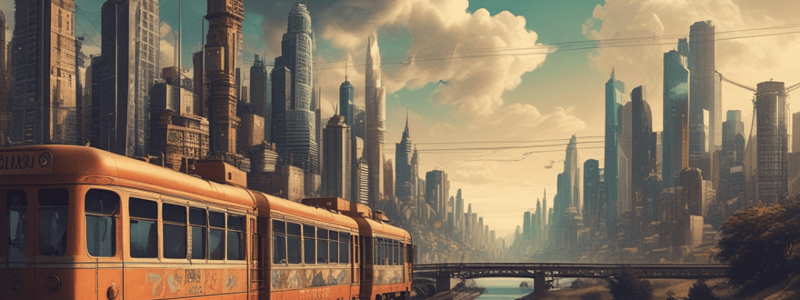Podcast
Questions and Answers
What is considered essential for a country to become fully developed?
What is considered essential for a country to become fully developed?
- Industrialization and urbanization (correct)
- Focus on agriculture
- Maintaining a small population
- Strict environmental regulations
What percentage of global carbon dioxide emissions is accounted for by the United States?
What percentage of global carbon dioxide emissions is accounted for by the United States?
- 15%
- 50%
- 40%
- 27% (correct)
Which countries are currently trying to catch up with the West in terms of economic growth?
Which countries are currently trying to catch up with the West in terms of economic growth?
- India, Indonesia, and Nigeria
- Russia, South Korea, and Mexico
- China, India, and Indonesia (correct)
- China, Japan, and Brazil
What environmental impact results from the desire for economic growth in developing countries?
What environmental impact results from the desire for economic growth in developing countries?
What is a major characteristic of 'extractive' economies?
What is a major characteristic of 'extractive' economies?
Why do developing countries see no reason to sacrifice economic growth for environmental protection?
Why do developing countries see no reason to sacrifice economic growth for environmental protection?
What challenge arises from the conflict between development needs and environmental sustainability?
What challenge arises from the conflict between development needs and environmental sustainability?
What major source of pollution is linked to vehicles in the U.S.?
What major source of pollution is linked to vehicles in the U.S.?
Study Notes
Environmental Challenges and Economic Development
- Governments view industrialization and urbanization as necessary for full development, believing that a robust middle class must have modern amenities.
- Developed societies are expected to provide jobs, public transportation, and affordable food for the poor.
- The United States exemplifies this model of development, recognized for its strong middle class until the 1970s and as a global economic power.
- The U.S. is historically labeled the "worst polluter," contributing 27% to global carbon dioxide emissions.
- About 60% of U.S. carbon emissions stem from vehicles used on highways and roads.
Developing Countries' Economic Aspirations
- Countries like China, India, and Indonesia are currently striving for rapid economic growth to match Western standards.
- These nations prioritize economic growth and access to cheap energy, leading to increased waste and environmental pollution.
- The economies of these developing nations are often categorized as "extractive" and termed "terminal," as they rely on depleting natural resources while also causing pollution.
Global Environmental Implications
- The U.S.'s approach to development and environmental impact serves as a troubling benchmark for developing countries, who may justify environmental degradation in pursuit of progress.
- The challenge lies in balancing the need for economic development in disadvantaged countries with the imperative of maintaining environmental sustainability.
Studying That Suits You
Use AI to generate personalized quizzes and flashcards to suit your learning preferences.
Description
Explore the intersection of industrialization, urbanization, and economic development. This quiz examines how governments prioritize building a middle class with access to modern amenities and the expectations placed on developed societies, especially in the United States. Understand the historical context and current challenges faced in achieving these goals.



